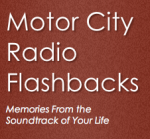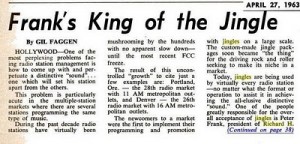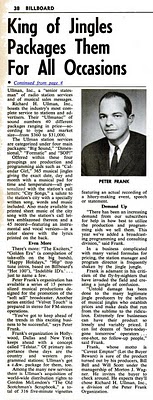WKNR ‘RICHARD ULLMAN’ ’63 SERIES ON MOTOR CITY RADIO FLASHBACKS
WKNR-AM 1310 * “One-derful Keenerland” * 1963-1964
![]()
 From the MCRFB news archive: 1963
From the MCRFB news archive: 1963
Peter Frank Is King Of The Jingle; Richard H. Ullman, Inc., Includes Client WKMH-AM Detroit
HOLLYWOOD — One of the most perplexing problems facing radio station management is how to come up with and perpetuate a distinctive “sound”. . . one which will set his station apart from the others.
This problem is particularly acute in the multiple-station market where there are several stations programming the same type of music.
During the past decade radio stations have been mushrooming by the hundreds with no apparent slowdown — until the most recent FCC freeze.
 The result of this uncontrolled “growth” to cite just a few examples are: Portland, Oregon — the 28th radio market with 11 metropolitan outlets, and Denver, Colorado — the 26th radio market with 16 AM metropolitan outlets.
The result of this uncontrolled “growth” to cite just a few examples are: Portland, Oregon — the 28th radio market with 11 metropolitan outlets, and Denver, Colorado — the 26th radio market with 16 AM metropolitan outlets.
The newcomers to a market were the first to implement their programming and promotion with jingles on a large scale. The custom-made jingle packages soon became “the thing” for the driving rock and roller seeking to make its niche with a Top 40 sound in their respective market.
Today, jingles are virtually being used by every radio station — no matter what the format or operation is to facilitate in attaining that all-elusive distinctive radio “sound. One of the people greatly responsible for the overall acceptance of radio jungles is Peter Frank, president of Richard H. Ullman, Inc., a “senior-statesman” of radio station services and musical sales messages in advertisement and commercials.
Richard H. Ullman, Inc., boasts providing the industry’s most complete service to stations and advertisers. Their “Ullmanac” of sound numbers 40 different packages ranging in price — according to type and market size — from $360 to $31,000.
The Ullman station services are categorized under four main packages: “Big Sound,” “Dimensional,” “Formatic,” and “SOP!” Offered within these four groups are production and programming aids such as “Calendar Girl,” 365 musical jingles giving the exact date, day and month with a musical pad for time and temperature — all personalized with the station’s call letters; “City Songs,” a salute to the station’s city or town with a specially written song, words and music included. Also made available is printed sheet music of the city song with the station’s call letters emblazoned thereon along with a 45 record — featuring an instrumental and vocal version — in a color sleeve with the lyrics printed on the back.
Even More
 And there’s more: “The Exciters,” “Golden Era,” (a compilation of take-offs with emphasis drawn on the “big band” sound), “Happy Holidays,” “Hip” (top tunes intros, based on Billboard’s “Hot 100”), “Indelible ID’s,” . . . just to name a few.
And there’s more: “The Exciters,” “Golden Era,” (a compilation of take-offs with emphasis drawn on the “big band” sound), “Happy Holidays,” “Hip” (top tunes intros, based on Billboard’s “Hot 100”), “Indelible ID’s,” . . . just to name a few.
Peter Frank’s organization has available a series of 15 personalized musical productions designed for the promotion of the “softer sell” broadcaster. Another series entitled “Velvet Touch” is programmed in stereo for FM-stereo band operations.
“You’ve got to keep ahead on the trends in this exciting business to be successful,” says Peter Frank.
Frank’s organization in Hollywood, Dallas and New York keeps ahead with a concept called “Telstar.” Of primary importance these days are the country and western formatted stations; Ullman also provides of their product in a C&W service package for them as well.
Among the many new services in the organization featured is Ullman’s acquisition of world-wide distribution rights to Gordon McLendon’s “The Old Scotsman’s Scrapbook,” a total of 316 five-minute vignettes featuring an actual recording of a history-making event, speech or statement.
Demand Up
“There has been an increasing demand form our subscribers for help in how best to utilize the production and programming aids we sell them. This year we’ve added a broadcasting and consulting division,” Frank remarked.
In a business complicated with many varied formulas for pricing, the station manager and program director is frequently shaken by the jingle jungle.
Frank is adamant in his criticism of the fly-by-nighters that have invaded the field and has, in his terms, created a plethora of confusion in who would best represent a client’s interest in any given market.
“Untold damage has been done to the many legitimate jingle producers by some sellers of radio and musical jingles who establish prices and make deals that run from the sublime to the ridiculous. Extremely few businesses can have their products so loosely and variably priced. I can list a dozen ‘here-today-gone-tomorrow’ operations. . . one-shot, no follow-up people that would only take their money and not be heard from again,” Frank stressed.
Frank, whose motto is “Caveat Emptor” (let The Buyer Beware) is sure of the product turned out guaranteed by his producers in the studios here, also elsewhere in New York and in Dallas, while naming Bill Bell and Will Scott under the management of Morton J. Wagner. Meanwhile, Frank invites the buyer to check around. Ultimately, he will expect they’ll eventually will choose Richard H. Ullman, Inc., a division of the Peter Frank Organization. End
(Information and news source: Billboard; April 27, 1963).
![]()